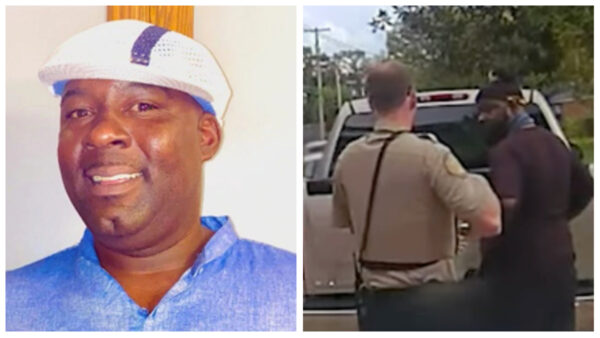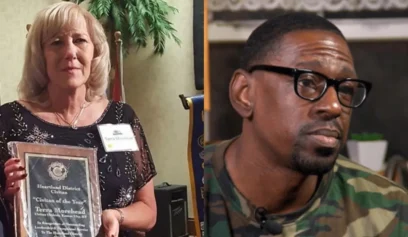Controversy is arising in Louisiana’s Rapides Parish as conflicting stories emerge about what happened when a local deputy shot a Black man to death during a traffic stop this month.
Lawyers representing the dead man’s family say they have received cellphone video from an eyewitness that contradicts the sheriff’s department account of the last moments before the 45-year-old was fatally shot. Now the family is calling for transparency and justice.

Facts that are not in dispute affirm that on Sunday, Nov. 6, an unnamed Rapides Parish deputy pulled over Derrick Kittling in Alexandria, Louisiana, and after being stopped the African-American motorist was shot. The incident occurred around 1:30 p.m.
After the shooting, Kittling, the brother of a high-ranking state police official, was taken by paramedics to a local hospital but died that same afternoon from injuries caused by a bullet to the head.
According to the sheriff’s office, “During the course of the traffic stop, a physical confrontation occurred between the Deputy and Kittling during which Kittling gained control of the Deputy’s Taser.”
“As the physical struggle ensued,” the report continues, “the Deputy discharged his duty weapon striking Kittling. Kittling was transported to a local hospital for treatment, but ultimately succumbed to his injuries.”
However, Ron Haley, a lawyer representing Kittling’s family, and his co-counsel, civil rights attorney Ben Crump, said they can prove there was no justification for the shooting.
According to the lawyers, they received two different cellphone videos that show the deputy had no reason to consider Kittling a deadly threat.
One of the videos has been released to Atlanta Black Star. The officer can be seen wrestling with Kittling, before aiming his gun (while the two are lying down) and fatally shooting at the unarmed man.
WARNING THE CONTENTS OF THIS VIDEO ARE GRAPHIC.
Haley is calling for the department to release bodycam footage of the deputy involved for a definitive account of what happened that day.
“Up to this point, we have not heard any information that my client had any type of contraband on him and we know that he was not armed,” Haley said. “And yet, it’s another routine traffic stop that somehow ends up with the loss of a life.”
Local activist Tony Brown has been speaking to media on behalf of Kittling’s family and shared the two videos with Vice News. The outlet says the bystander lived in the vicinity of the traffic stop and watched the deputy, whose identity is being withheld by the agency, shoot the Black man in his head.
Vice has not published the videos themselves but has provided a description of what they depict:
One of the videos is only 12 seconds long and shows the officer and Kittling tussling on the ground between his patrol vehicle and a pickup truck. At the beginning of the record, audio captures a sound like that of a Taser being discharged.
At this point, Kittling is standing above the officer. While the video is unclear about if anyone was jolted by the stun gun, Haley believes the fact the two men are continuing to wrestle each other without impedance suggests neither of the men were hit.
At one point, the bystander recording tries to move closer and the camera loses view of the fight for a few seconds. When it regains focus, the advantage is with the officer and Kittling is on the ground with his head near the officer’s lower legs.
As the man lifts his hand up to the cop, the officer looks as if he is posturing to let off his weapon. A single shot is fired, ending Kittling’s life.
A voice is heard saying, “Damn, man, should have saved him, bro!” The video recorder also speaks out, saying, “He killed that man.”
The second video is longer and is shot by the same person, according to Haley. This video captures the reactions of the officer immediately after the shooting.
Another witness says in the video Kittling was unarmed when he was shot. It is at that time; the deputy goes to his patrol unit and signals on his radio to other officers. He says, “Shots fired. Gunshot wound to the head.”
“Yeah, the police killed that man right there,” the recorder continues to give commentary and says to other witnesses. “He couldn’t handle that man, he was trying to tase him for no reason, pulling that man out the truck. That man had a family, man. You didn’t have to kill that man.”
“What’s most interesting to me about the video, is not what you can see, it is what you can hear,” Haley says, “It was alluded by the sheriff during [Sunday’s] press conference that the reason why the deputy said that he pulled out his gun and shot Mr. Derrick in the head was that Mr. Derrick went for his taser. A taser is not used for deadly force.”
Reaching for a Taser, Haley further argues, is also not grounds to use deadly force.
“You can hear the taser being deployed,” Haley continued. “Which means the reason [the officer] felt deadly force needed to be used is because [Kittling] was reaching for what was essentially an unloaded weapon. Because if the taser had been deployed, [Kittling] could get the taser all he wants, but there’s nothing that can happen to the deputy.”
It is not clear whether the deputy was equipped with a modern Taser that can fire more than once.
Master Trooper Casey Wallace said the Rapides Parish Sheriff’s Office asked the Louisiana State Police to oversee the investigation.
Since the request, both agencies have launched an initial probe into the police-involved killing, promising to review all bits of evidence presented in the case, including but not limited to the deputy’s body camera, the cellphone videos, and the deputy’s actions immediately afterward.
Commenting on the ongoing investigation is against law enforcement’s policy, however, state police spokesperson Daniel Moreau did say, “When we have information that can be provided without jeopardizing the integrity of it, then we will certainly do so.”
On Tuesday, Moreau also said Kittling’s brother Lt. Col. Kenny Van Buren, who has served as deputy superintendent of Louisiana’s Bureau of Investigations since January 2021, will not be involved in the “thorough and impartial” investigation, recognizing the obvious conflict of interest.
Kittling worked as a mechanic and was a father of three who was known to visit friends and family in the neighborhood. His funeral will be held on Nov. 19.


